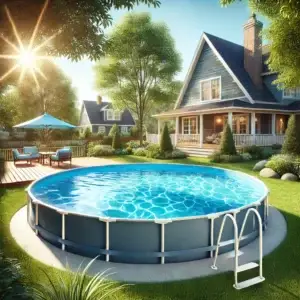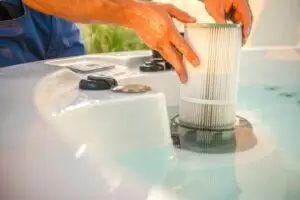Pools are supposed to be a fun way to cool off. They offer solace, relaxation, an opportunity for socialization, and a place for fun and games. However, pools can also be messy and annoying, depending on the size of your backyard.
Large backyard pools can mean that pool maintenance is more complicated than it should be — particularly setting up filtration systems if the filter pump is broken or clogged up with stuff like leaves or small stones from landscaping.
For this reason, you might consider hiring professionals to clean your pool more often than once a month or so. Here are some signs your pool needs professional service or repair.
Your Filter Pump Isn’t Working
Your filter pump is an integral part of your pool’s filtration system. It works by pumping water out of the pool and pumping it through a filtration system that removes debris. If your filter pump isn’t operating correctly, you’ll have many problems, such as cloudy water, reduced water purification efficiency, and bacteria build-up.
An excellent way to tell if you need professional repairs on your filter pump is if the water flow starts to slow down or completely stop. Because filtration requires moving the water around to filter out impurities, your pool will become gunky and full of debris. Whether your pump is broken or worn out, you should consider replacing it.
The Water Has Too Much Chlorine in It
While chlorine is essential to keeping pools clean and sanitized, it can often get out of hand, which can cause a lot of problems. For instance, Chlorine may stain your concrete and walls, which may also smell aggressive when levels are too high.
If you don’t correct this problem immediately, you may also find yourself dealing with algae problems, though some people still prefer using chlorine more than other methods to keep algae at bay. If you notice that your water has too much chlorine, it means that it’s damaging to the pool, and you need to remove it immediately.
Leaks in Pool Walls
If your pool water leaks, several things could be the cause—for instance, your pool pump’s seal or a porous area around your pool’s floor. Leaks may also occur if you have cracks in your swimming pool structure or if there are cracks in the skimmer line or the suction area of your swimming pool’s pump itself.
Additionally, many equipment and chemicals can get into your pool and cause the water to leak. If you notice that even though your pool still holds water, some of it seems to be escaping, you may have a problem.
You first have to test the leaks by filling up a bucket of water and placing it in the area where the leak occurs. Then wait for 24 hours for how much water has leaked out. Depending on how much was detected, at this point, you should call a certified swimming pool repair professional to diagnose the issue immediately.
Your Pool Surface Is Stained
Light stains usually indicate calcium deposits, while darker stains often point to rust. Either way, they are a sign that your pool needs some serious attention. Seasonal temperature changes can cause the staining, but you’ll want to get it cleaned up before they become permanent wall fixtures.
The best way to remove stains is a good scrubbing with a brush and some bleach – be sure not to use chlorine bleach as it can further irritate the stain and make it even harder to remove.
You Hear a Cracking Noise When You Dive In
If you’re hearing odd cracking noises when people enter the pool, your diving board may need some maintenance. If the board is old and needs repair, call a professional to take it down immediately. Before you take any action, though, inspect the rest of your pool for areas that could be damaged or worn down.
You See a Cloudy Pool Water
Cloudy pool water can happen as a result of different issues. Bacteria and algae growing in the swimming pool can cause cloudiness, especially if your pool water has been stagnant for quite some time. In addition, water may also start to look cloudy when it’s too much chlorine or too many minerals.
The metals or other materials get dissolved into the water and cause material build-ups on the surface of your swimming pool’s walls, floor, and even your swimming pool filters.
You can use your netting and skimmer to keep debris out of your filter. If you notice a lot of dead algae or other forms of plant life on the top of the water that is not filtered, try to brush those away with a pool vacuum and follow up with a cycle. If the problem persists, you need to call for professional help.
The Presence of Algae Growth
Algae is common in swimming pools. It can occur naturally, but chemical spills and other chemicals can lead to the growth of fungi. If your pool has been closed for a while and you go back to use it, algae will already have started to grow.
You may see gross chunks of green floating around. These little plants emit a gas that causes itching if you touch them directly or breathe the air in them.
If you want an algae-free pool, you must change your filter and possibly add some new chlorine forms, which is why it is essential to ensure you have the right filter for your needs and that you are using it right.
You Have Bad Smells Coming From your Swimming Pool
Suppose there are any problems with your pool’s pump and water system. In that case, it will likely produce bad smells when not in use, so you should replace these parts as soon as possible to avoid the possibility of getting sick from swimming in a contaminated pool.
You also may want to buy a chlorine generator which will help with your pool’s smell and bacteria levels.
Your Swimming Pool Has a Large Number of Leaves in It
Leaves can mess up the water flow and cause severe problems for you and your pool, such as algae growth, water-damaged vinyl liners, and loss of circulation. You should consider hiring a pool cleaner to get rid of leaves before they have a chance to settle in the bottom.
The Water is Heating up Too Fast
You may think that you have an issue with the heating process in your swimming pool, especially if it’s constantly getting hot instead of staying cold for an extended period. In some cases, this may be a filter issue causing it to get dirty too quickly and therefore affecting the heating process.
If your local pool store doesn’t have a solution for you, consider calling a professional because you will most likely have to replace the filter or at least get it cleaned.
The Water Doesn’t Have the Proper pH Balance
Pool waters have a pH level between 7-7.6, which is the level to match your water, which is crucial because it controls how your body reacts to chlorine or other chemicals in the water, so you don’t get sick from them.
If your pH level has gone too high or too low, check it out immediately and ensure everything is working correctly. A pool can reach up to 8 different pH levels; if they’re out of range, they just won’t be clean and sanitized as efficiently.
The Deck is Bowed
When your pool deck is bowing upwards, it usually means that you have poor drainage around the area, which can cause many problems over time because water will stagnate around the area and give bacteria a place to grow and flourish.
If you notice that your pool deck is bowed upwards, it may be time to replace the pool liner or work on your drainage system to fix this problem.
Presence of Broken Swimming Pool Lights
If your pool’s lights are not working, it can cause many problems. For instance, if you’re someone who tends to tan by the swimming pool, broken lights could make it hard for you to do so. If your pool has water features such as waterfalls and fountains, broken lights can also be hazardous because kids might get hurt playing around them.
Plus, broken swimming pool lights can affect the aesthetics of your whole backyard. And if they’ve been broken for quite some time now, the bulbs are already burned out and will need replacement.
The Wrap Up
If you’re experiencing these signs, call a pool professional. Pool aches, cracks, or other leaks could lead to significant damage that would be pricey to repair or could even put your family in danger if not addressed.
The sooner the problem is addressed and corrected, the less damage to your pool and surrounding structures. And most importantly, the faster you address these issues, the faster you can enjoy your pool again.

/imp-themes/background/hot-tub-spa-water.jpg)


 by
by 